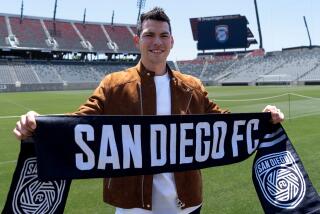Little League of Their Own : Two Endeavors Pay Off as Teams Begin Season in South-Central
- Share via
As he watched a Little League team from Long Beach win its second world championship two years ago, Los Angeles Police Officer Mark Durrell wondered why there wasn’t a similar baseball program in South-Central Los Angeles where he grew up.
For Durrell, the question became a quest to bring Little League to the area. And on Saturday, he and other South-Central residents welcomed to their community what is a mainstay in most other neighborhoods.
For parents such as Billy Ross, watching his 7-year-old son, Terrance, and about 150 other youngsters line the infield during opening day ceremonies, the Little League program is an alternative to street life for many youths.
“When a child’s got nothing to do, he’s thinking about what devilish things he can get into whether it’s playing with matches at home or playing with guns on the street,” Ross said.
For youngsters such as 8-year-old Marvin Arnold, the nine-team league means a temporary end to Saturday afternoons of picking on his two younger sisters.
And for a satisfied Durrell, Little League in South-Central is “a dream come true.”
The birth of the program came when Durrell and Little League International officials began working unbeknown to each other for the same goal.
On one hand, there was Durrell, who since 1993 had been working with officials at Harvard Park at 62nd Street and Denker Avenue to organize a youth baseball program that he hoped would be officially sanctioned by Little League officials.
At the same time, a group of public and private organizations began working with Little League officials to bring a team to South-Central as part of efforts to expand into inner cities nationwide.
The two endeavors crossed paths last fall when Durrell, 33, was phoned by a friend with the news that Little League officials were working to build a baseball field to league specifications at Martin Luther King Jr. Park and planned to begin recruiting teams.
*
Little League officials had been trying for two years to create franchises in the inner cities of Los Angeles and New York. The hope, said Tom Boyle, a special projects consultant with Little League International, was to offer at-risk youths an alternative to crime and gang violence and help foster a sense of self-esteem and community respect.
The $200,000 stadium project is expected to be completed by spring, 1996, with funding from sources including the Hilton Hotel Corp., the Amateur Athletic Foundation, the Los Angeles Dodgers and the city Department of Recreation and Parks.
Several factors were cited for why it has taken so long for South-Central to get Little League teams.
Chilton Alphonse, executive director for the Community Youth Sports and Arts Foundation in the Crenshaw district, said many South-Central residents lack the extra money to pay for registration fees and baseball equipment.
At $25 per player, the registration fee for South-Central teams is the lowest of all franchises in the region, some of which charge up to $50 or more, Durrell said. The fee has been waived for many players because their families cannot afford it. Durrell hopes to make up the shortfall and cover much of this year’s $50,000 start-up budget with private donations. Another problem, Boyle said, was attracting enough volunteers to run the program in a predominantly working-class community.
For Fred Thomas, owner of a real estate office at Slauson Avenue and Crenshaw Boulevard, time is money. But he said the need for the program persuaded him to set aside a spot in his hectic schedule to coach the dozen or so youngsters on his team. “I figured if I didn’t take time how could I expect some one else to do it,” he said.
Next Saturday, the season’s 20-game schedule will begin for program participants, mostly Latino and African American boys and girls 5 to 15 years old. They will play on teams named after clubs in the Negro Leagues of the 1920s, ‘30s and ‘40s, and professional teams in Mexico.
“It’s to show them the roots of their heritage (involving) baseball,” Durrell said.
More to Read
Go beyond the scoreboard
Get the latest on L.A.'s teams in the daily Sports Report newsletter.
You may occasionally receive promotional content from the Los Angeles Times.










